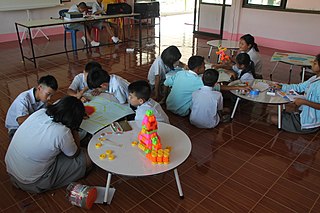Educational psychology is the branch of psychology concerned with the scientific study of human learning. The study of learning processes, from both cognitive and behavioral perspectives, allows researchers to understand individual differences in intelligence, cognitive development, affect, motivation, self-regulation, and self-concept, as well as their role in learning. The field of educational psychology relies heavily on quantitative methods, including testing and measurement, to enhance educational activities related to instructional design, classroom management, and assessment, which serve to facilitate learning processes in various educational settings across the lifespan.
The philosophy of education is the branch of applied philosophy that investigates the nature of education as well as its aims and problems. It also examines the concepts and presuppositions of education theories. It is an interdisciplinary field that draws inspiration from various disciplines both within and outside philosophy, like ethics, political philosophy, psychology, and sociology. Many of its theories focus specifically on education in schools but it also encompasses other forms of education. Its theories are often divided into descriptive theories, which provide a value-neutral description of what education is, and normative theories, which investigate how education should be practiced.
Intellectual giftedness is an intellectual ability significantly higher than average and is also known as high potential. It is a characteristic of children, variously defined, that motivates differences in school programming. It is thought to persist as a trait into adult life, with various consequences studied in longitudinal studies of giftedness over the last century. These consequences sometimes include stigmatizing and social exclusion. There is no generally agreed definition of giftedness for either children or adults, but most school placement decisions and most longitudinal studies over the course of individual lives have followed people with IQs in the top 2.5 percent of the population—that is, IQs above 130. Definitions of giftedness also vary across cultures.
Gifted education is a sort of education used for children who have been identified as gifted or talented.
The Reggio Emilia approach is an educational philosophy and pedagogy focused on preschool and primary education. This approach is a student-centered and constructivist self-guided curriculum that uses self-directed, experiential learning in relationship-driven environments. The programme is based on the principles of respect, responsibility and community through exploration, discovery and play.
A hidden curriculum is a set of lessons "which are learned but not openly intended" to be taught in school such as the norms, values, and beliefs conveyed in both the classroom and social environment. In many cases, it occurs as a result of social interactions and expectations.

Project-based learning is a teaching method that involves a dynamic classroom approach in which it is believed that students acquire a deeper knowledge through active exploration of real-world challenges and problems. Students learn about a subject by working for an extended period of time to investigate and respond to a complex question, challenge, or problem. It is a style of active learning and inquiry-based learning. Project-based learning contrasts with paper-based, rote memorization, or teacher-led instruction that presents established facts or portrays a smooth path to knowledge by instead posing questions, problems, or scenarios.
Educational technology is the combined use of computer hardware, software, and educational theory and practice to facilitate learning. When referred to with its abbreviation, "EdTech", it often refers to the industry of companies that create educational technology. In EdTech Inc.: Selling, Automating and Globalizing Higher Education in the Digital Age, Tanner Mirrlees and Shahid Alvi (2019) argue "EdTech is no exception to industry ownership and market rules" and "define the EdTech industries as all the privately owned companies currently involved in the financing, production and distribution of commercial hardware, software, cultural goods, services and platforms for the educational market with the goal of turning a profit. Many of these companies are US-based and rapidly expanding into educational markets across North America, and increasingly growing all over the world."
Constructivist teaching is based on constructivism. Constructivist teaching is based on the belief that learning occurs as learners are actively involved in a process of meaning and knowledge construction as opposed to passively receiving information.
This glossary of education-related terms is based on how they commonly are used in Wikipedia articles. This article contains terms starting with G – L. Select a letter from the table of contents to find terms on other articles.
Eklavya is an Indian NGO based in Bhopal, Madhya Pradesh working in the field of education. It was registered as an all India in 1982. The organization is named after Eklavya, the protagonist of a story in the Mahabharat, for his determination to learn even in the absence of a teacher.

An educational video game is a video game that provides learning or training value to the player. Edutainment describes an intentional merger of video games and educational software into a single product. In the narrower sense used here, the term describes educational software which is primarily about entertainment, but tends to educate as well and sells itself partly under the educational umbrella. Normally software of this kind is not structured towards school curricula and does not involve educational advisors.
Independent study is a form of education offered by many high schools, colleges, and other educational institutions. It is sometimes referred to as directed study, and is an educational activity undertaken by an individual with little to no supervision. Typically a student and professor or teacher agree upon a topic for the student to research with guidance from the instructor for an agreed upon amount of credits. Independent studies provide a way for well-motivated students to pursue a topic of interest that does not necessarily fit into a traditional academic curriculum. They are a way for students to learn specialized material or gain research experience.

Leta Stetter Hollingworth was an American psychologist, educator, and feminist. She made contributions in psychology of women, clinical psychology, and educational psychology. She is best known for her work with gifted children.

The cinema of Kenya refers to the film industry of Kenya. Although a very small industry by western comparison, Kenya has produced or been a location for film since the early 1950s when Men Against the Sun was filmed in 1952. Although, in the United States, jungle epics that were set in the country were shot in Hollywood as early as the 1940s.

The term twice-exceptional or 2e refers to individuals acknowledged as gifted and neurodivergent. On literal sense, it means a person, is at the same time, very strong or gifted at some task, and very weak or unable in some other task. Due to this duality of their cognitive profile, the strengths as well as weaknesses and struggles may remain unnoticed or unsupported. Also conditions like hyperlexia or precocious development in some aspects, while having difficulties in common or day-to day tasks, these people may frequently face contradictory situations which lead to disbelief, judgements, alienation, and other forms of epistemic injustice. Some related terms are "performace discrepancy", "cognitive discrepancy", "uneven cognitive profile", and "spikey profile". Due to simultaneous combination of abilities and inabilities, these people do not often fit into an age-appropriate or socially-appropriate niche. An extreme form of twice-exceptionalism is Savant syndrome. The individuals often identify with the description of twice-exceptional due to their unique combination of exceptional abilities and neurodivergent traits. The term twice-exceptional first appeared in Dr. James J. Gallagher's 1988 article titled National Agenda for Educating Gifted Students: Statement of Priorities. Twice-exceptional individuals embody two distinct forms of exceptionalism: one being giftedness and the other including at least one aspect of neurodivergence. Giftedness is often defined in various ways and is influenced by entities ranging from local educational boards to national governments; however, one constant among every definition is that a gifted individual has high ability compared to their age-level neurotypical peers. The term neurodivergent describes an individual whose cognitive processes differ from those considered neurotypical and who possesses strengths that exceed beyond the neurotypical population. Therefore, the non-clinical designation of twice-exceptional identifies a gifted person with at least one neurodivergent trait.
Learning through play is a term used in education and psychology to describe how a child can learn to make sense of the world around them. Through play children can develop social and cognitive skills, mature emotionally, and gain the self-confidence required to engage in new experiences and environments.
The Junior Academy of Sciences of Ukraine is a governmental organization concerned with extracurricular science teaching. It is an integrated, multilevel system that has been instituted to identify children with special scientific talents. The Junior Academy of Sciences is subordinate to the National Academy of Sciences and the Ministry of Education and Science of Ukraine. It arose from the local network of pioneer palaces.
Modern elementary mathematics is the theory and practice of teaching elementary mathematics according to contemporary research and thinking about learning. This can include pedagogical ideas, mathematics education research frameworks, and curricular material.

The Institute for Sociology of Education of the Russian Academy of Education is a Russian research institute in the area of sociology of education.






